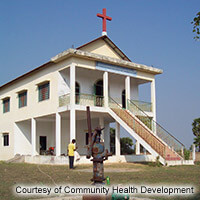Community Health & Agricultural Development (CHAD-Cambodia)

Project Information
Transforming church and communities through holistic community development.
Describe the need affecting community
How will this Advance project help to address the need?
CHAD will assist households meet beyond their daily food and nutritional requirements to generating surplus assets, by increasing the diversity of food production through vegetables and livestock. IFS will integrate crop and livestock components of each family source of livelihood. The different components of IFS will include chicken raising, rice production, composting/green manure, and vegetable gardening. Meat and eggs from chicken raising will provide protein requirement to each family members. Chicken manure, composting and green manure will be used to increase soil fertility in rice production. Rice straw will be used as a medium for mushroom production while rice bran will be used to feed chickens. Highly nutritious vegetables such as leafy vegetables, squash, bitter gourd, and moringa will be used in home gardening. These crop and livestock integration (as a closed system) will ultimately sustain the family. In the same way, the program will also reduce dependency of farmers on harmful chemical fertilizers, and pesticides through promotion low-external input agriculture (LEISA) and improved appropriate technology. Bio-Intensive gardening will provide diversified source of high nutrition foods for the family, and for farmers to select crop varieties that can be used as drought and flood resistant crops. This project will reduce pest-disease incidence through companion crops, crop rotation and intercropping. This practice will ultimately reduce the use of chemical fertilizers and pesticides. Attaining food security alone is not enough to ensure sustainability therefore the program will also improved access of households to safe water, and proper sanitation facilities. CHAD will introduce the Community-Led Total Sanitation (CLTS) approach to assist families/communities build latrines and communal water points/sources as well as distribution of water filters to families. Thus, CHAD will transition from subsidy into loan-based approach in implementing these activities in the target areas. Through savings-based credit groups the program will provide a small grant that households can access as loans to build latrines/wells or purchase water filters. All loans will repaid back and will become part of the revolving fund of the community for WASH activities. Like wise, primary health education and village health volunteers’ trainings will be implemented to increase the level of awareness and skills in the target communities on hygiene and sanitation. CHAD will organize the Water Management Groups to raise issues on watershed and irrigation problems to Government and other NGO’s in their locality. To reduce the impact of erratic climate pattern on food and livelihood security, the program will assist households to become climate resilient by improving their knowledge and skills on climate change. To achieve this objective the program will do awareness raising campaigns and will provide trainings and participatory assessment on Climate, and Disaster Risk (PACDR) in the target communities. Target communities will learn and identify specific area in the community and livelihood sources that were vulnerable during floods and storm through Hazard Map and Seasonal Calendar. Target beneficiaries will develop short-term and long-term adaptive measure against climate change impacts.
Describe the primary goal of the project
The project aims that the Methodist Church in Cambodia will be income and food secure, healthy and resilient against climate change.
Describe the change you would like to see in the community as a result of this Advance project
1. In five years, 80% of Methodist Church in Cambodia leaders, pastors and members sustain outreach activities in their communities. 2. In five years 90% of participant households have improved access to government hospitals, health education and sanitation. 3. In five years 60% of participant households sustainably increase their agricultural production by 10-15% from 2014 baseline. 4. At least 60 % of participant households increase diversity of food production through vegetables and livestock in two years from 2014 baseline. 5. At least 40% of participant households increase amount of income by 30% and at-least 1 alternative sources of income from 2014 average income baseline. 6. In two years 40% of participant households increase resilience by implementing at least 2 climate change adaptation measures.

